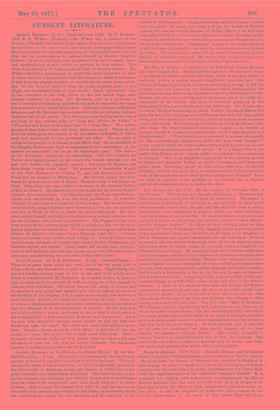Life Among my Ain Folk. By the Author of "Johnny
Gibb of Gushetneuk." (Edmonston and Douglas, Edinburgh.)— There are four little tales in this book, and all of them are interesting. The author is well-known in the North of Scotland as one well able to paint rural characters and scenes from the life, and his sketches have a power, truthfulness, and consistency of purpose which are often wanting in local renderings of provincial life. Of the four tales hero given we are inclined to prefer, on the whole, the shortest, called "Francici Herrie- gerrie's Shargor Laddie." Its effect is very striking, more so than the story of "Mary 'Williamson's Wee Maggie," and it deals with a side of the agricultural labourer's life which, in Scotland as in England, is full of bitterness and painful associations for all concerned. Francie is married, but has to slave from early morn till late at night on a farm miles away from his family, whom he sees only once a fortnight in the ordinary course of things. He struggles to get out of this miserable state of life, but cannot, and has to plod away back to the farm-work again after a winter's job-work about the village. His boy—the " sharger," or under- grown " laddie "—is very intelligent but weak, and his parents have fears for him, that time only too well justifies, although his father meantime builds fondly a little castle in the air for his son, in spite of them all. But the fears come true. Cooped up in the unhealthy alley of the agri- cultural village, poor little Willie pines away, and dies in his father's absence. A mare at his master's was near her foaling, and Francia could not be spared to go and close the eyes of his child, hardly could he get to his burial. A sad story, and a true ; the poor are too often thus driven off the face of the land, and huddled into villages, to their misery and to nobody's real good. The first tale, "Mary Williamson's Wee Maggie," is also very tenderly told, and grave or gay, they are all above the level of such stories ; but the exceeding fidelity with which the rough, broad dialect of the North of Scotland is rendered, valuable as it is to some, must render it almost impossible for any but a Scot to read the book, let alone enjoy it. To those who can read it, and who do not care for sentiment, lest they should imagine all its hues sombre, we commend "Couper Sandy." His history is hardly a "story," but it is a character-sketch full of rich, dry humour. The method by which Sandy's father-in-law that is to be rescues him from the enemy and provides him with a wife is just exquisite.


































 Previous page
Previous page